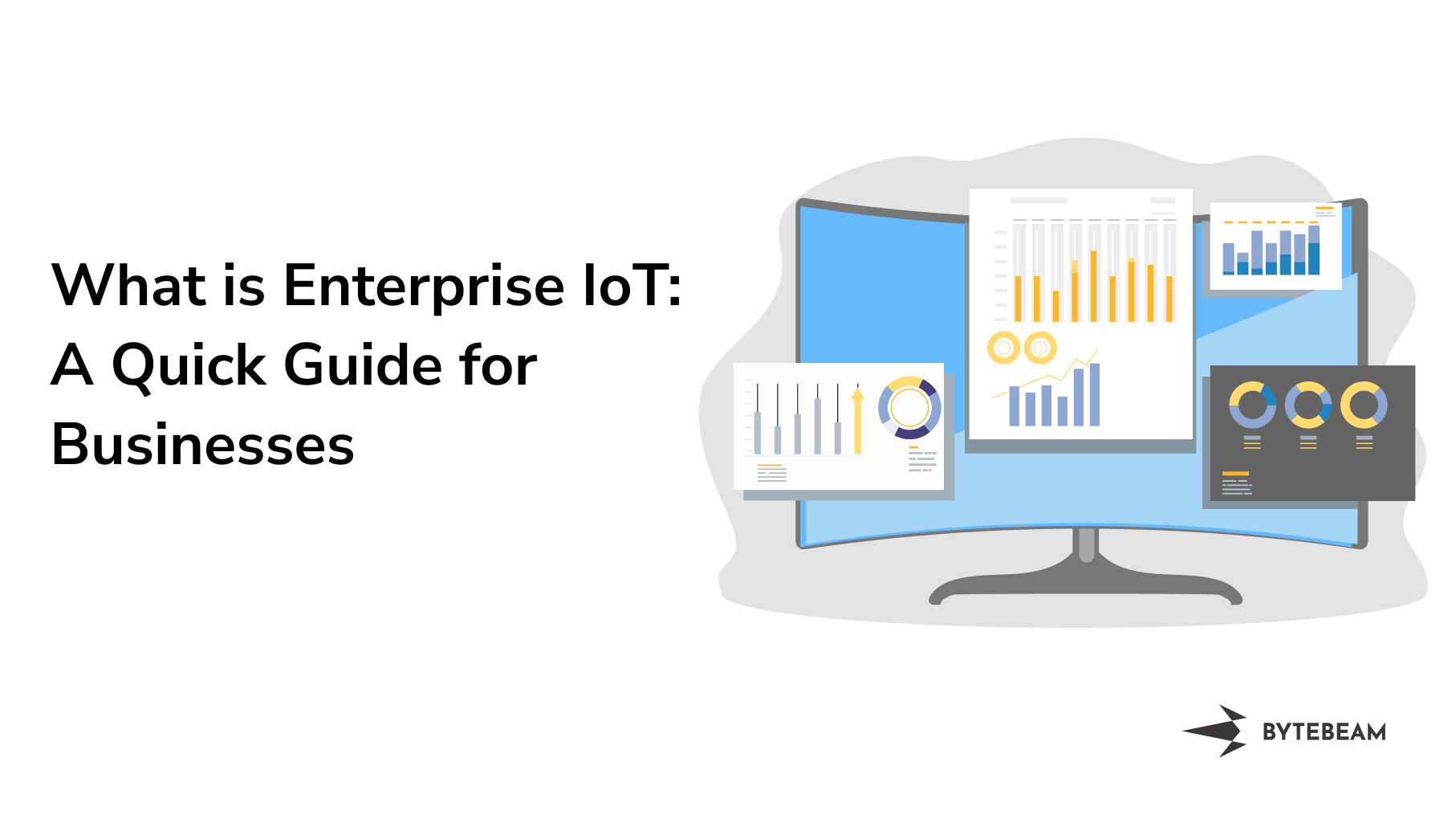What is Enterprise IoT: A Quick Guide for Businesses

Enterprise IoT is a rapidly growing tech vertical. So much so that, according to Global Data, enterprise IoT made up over 76% of the global IoT market in 2020.
But what is enterprise IoT, and what makes it different from regular IoT applications?
What to expect: In this article, we want to explore the applications of enterprise IoT, while also discussing why it is important for large businesses to leverage it.
What is Enterprise IoT?
When you integrate IoT with business processes and operations, you get enterprise IoT. Enterprise IoT allows businesses to employ IoT devices such as sensors, scanners, printers, etc. to collect operations-specific data and optimize processes that are generally not easy to optimize.
Put simply, it is IoT for enterprises, meaning that it is supposed to be far more refined and functional than regular IoT solutions.
Let us take the example of a multinational company, with thousands of employees. Enterprises of this scale have several processes running in parallel, while also being interdependent. But there are several places in which the time taken, or the resources used can be optimized. For example, electricity usage in the company premises. Using motion sensors and automating brightness or temperature, energy consumption can be improved significantly, especially for large-scale organizations.
While this is a crude example, it signals just how many opportunities enterprise IoT can provide for optimizing processes.
Real-World Applications of Enterprise IoT
Enterprise IoT has found applications across various industries, some of which include:
- Manufacturing: IoT devices monitor equipment, predict maintenance needs, and optimize production processes.
- Healthcare: Remote patient monitoring, telemedicine, and smart medical devices improve patient outcomes and streamline healthcare delivery.
- Retail: IoT solutions enable inventory management, customer behavior analysis, and personalized marketing campaigns.
- Transportation: IoT applications support fleet management, route optimization, and vehicle diagnostics in the transportation sector.
- Energy: Smart grids and connected devices optimize energy consumption and reduce costs in the energy sector.
In industries such as healthcare or energy, lapses are not affordable. Here, a far more refined and reliable system is required, and this is where enterprise IoT comes into play.
Benefits of Implementing Enterprise IoT Solutions
Implementing Enterprise IoT solutions has a lot of benefits. But the most obvious one is the improved functionality overall. Enterprise IoT solutions are designed to ‘just work’. At Bytebeam, our enterprise solutions are tailored to the very specific and niche requirements of each business. A lot of consideration goes into ensuring that the user has next to no issues when operating the product.
Other than the obvious benefit, there are several other benefits that call for consideration:
- Operational Efficiency: Real-time monitoring and automation improve resource allocation and streamline processes.
- Cost Savings: IoT-enabled predictive maintenance reduces downtime and equipment repair costs.
- Data-Driven Decision-Making: Access to accurate and timely data supports informed decision-making.
- Enhanced Customer Experience: Personalization and proactive service delivery enhance customer satisfaction.
- Innovation: IoT solutions facilitate the development of new products and services, driving business growth.
Challenges and Concerns in Enterprise IoT
Despite being a wonderful opportunity for businesses, enterprise IoT does come with significant challenges. IoT, as a technology as well as an industry, is evolving. And in general, there are several challenges in IoT development. Let us take a look at some of them:
- Security and Privacy: The interconnected nature of IoT devices increases vulnerability to cyberattacks and data breaches.
- Data Management: Handling massive amounts of data requires robust data storage and processing capabilities.
- Interoperability: Integrating devices and systems from different vendors can be complex and time-consuming.
- Scalability: Enterprises must plan for and manage the growth of their IoT systems as their needs evolve.
- Regulatory Compliance: Organizations must comply with industry-specific regulations and standards, such as GDPR and HIPAA.
None of these challenges are so troublesome that they cannot be overcome. A strong IoT platform that offers robust security features and strong network protocols can help mitigate most of these challenges.
As far as regulatory compliance are concerned, they too can be taken care of with some planning and ensuring that you pick the right technology partner for your IoT projects.
Best Practices for Enterprise IoT Deployment
To ensure successful Enterprise IoT deployment, organizations should consider the following best practices:
- Develop a Comprehensive Strategy: Define clear objectives, use cases, and key performance indicators (KPIs) to guide IoT implementation.
- Prioritize Security and Privacy: Implement strong security measures, such as encryption and multi-factor authentication, to protect sensitive data and devices.
- Choose Scalable and Interoperable Solutions: Opt for platforms and technologies that support easy integration and can scale to accommodate future growth.
- Invest in Employee Training: Train employees to understand and effectively use IoT systems, promoting a culture of innovation and collaboration.
- Leverage Data Analytics: Utilize advanced data analytics tools to derive actionable insights from collected data, driving informed decision-making.
- Monitor and Optimize: Continuously monitor system performance, making adjustments and improvements to maximize ROI.
Enterprise IoT use cases
Enterprise IoT is more than just a buzzword and has practical use cases. Let us take a look at two interesting pieces of research that delve deeper into the possible use cases.
Enterprise IoT for HR
A recent study investigates how IoT technology is reshaping the HR management landscape. With IoT devices and systems integrated into HR processes, companies can enhance efficiency, automate tasks, and make data-driven decisions.
IoT is transforming various HR aspects like recruitment, performance evaluation, and employee engagement. For example, IoT-enabled wearables can monitor employee productivity and well-being, providing valuable insights for performance management. In recruitment, IoT devices can streamline the interview process with automated scheduling and remote interviewing through smart cameras and microphones.
However, the study also highlights potential challenges, such as privacy concerns, security issues, and employees' resistance to new technology. To fully benefit from IoT in HR management, companies should invest in employee training to familiarize staff with new devices, create transparent privacy policies to address concerns, and implement robust cybersecurity measures to protect sensitive data.
By doing so, businesses can enjoy the advantages of IoT in HR management while minimizing potential problems, ultimately revolutionizing the way HR teams work and interact with employees.
Is metaverse the future?
Gartner's research predicts that by 2026, a quarter of people will spend at least an hour a day in the metaverse, a super immersive digital world that mixes social media, gaming, and virtual reality. This growing trend will have a big impact on enterprise IoT, or the Internet of Things.
As more people explore the metaverse, businesses will use various IoT devices to gather data and create personalized experiences in real-time. For example, smart sensors can track user behavior and preferences, helping companies tailor virtual experiences, like immersive shopping or entertainment events. Wearable devices, like AR glasses or haptic suits, can enhance user interactions within the metaverse, providing a more realistic and engaging experience.
To stay ahead, companies need to improve their IoT strategies by focusing on interoperability, scalability, and security. By connecting different devices seamlessly, ensuring they can handle increasing data and user loads, and keeping everything secure, businesses can unlock new opportunities for innovation and collaboration.
In the end, these developments will drive the creation of new IoT-based services, products, and business models, changing the way we work, communicate, and shop in the metaverse.
Final Thoughts
Enterprise IoT is a refined service that employs IoT solutions for industries that rely on precision, accuracy, and speed. While there are several enterprise IoT solutions out there, the only way to find the right solution for your requirements is to make sure that it is customizable to your needs.
If you would like to take a look at Bytebeam’s enterprise offerings, feel free to reach out to us for a quick demo!
Frequently Asked Questions
What is the enterprise IoT?
Enterprise IoT refers to the use of connected devices and systems within businesses to improve operations, efficiency, and productivity. It encompasses tools like smart sensors in factories, fleet management systems, and building automation. Think of it as "smart" tech for businesses.
What is an example of enterprise IoT?
An example of enterprise IoT is a smart thermostat in an office that adjusts temperatures based on occupancy, saving energy costs. Another is sensors on factory machines sending real-time data to predict when maintenance is needed, preventing unexpected breakdowns.
What is the difference between IoT and enterprise?
IoT (Internet of Things) refers to interconnected devices that collect and exchange data. Enterprise IoT focuses on implementing IoT solutions in business environments to optimize operations, enhance productivity, and generate new revenue streams. Essentially, it's IoT tailored for business needs.

